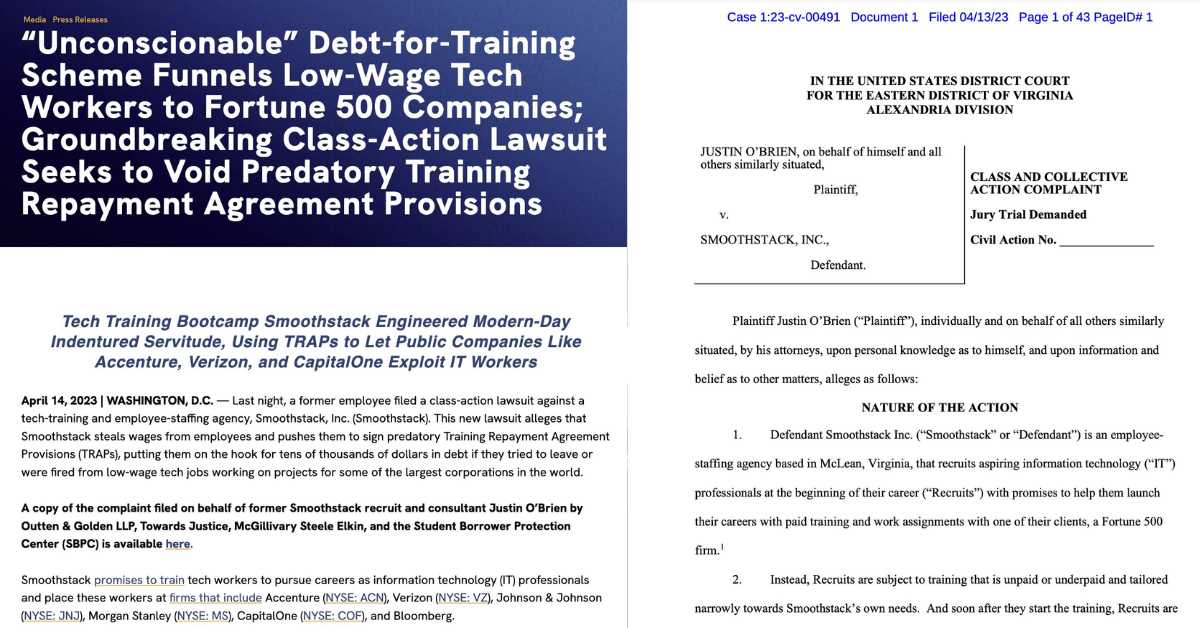In a shocking turn of events, a former employee has initiated a groundbreaking class-action lawsuit against Smoothstack, a tech-training and employee-staffing agency, revealing a disturbing debt-for-training scheme. The lawsuit, filed on behalf of Justin O’Brien, accuses Smoothstack of subjecting low-wage tech workers to a modern-day indentured servitude, utilizing Training Repayment Agreement Provisions (TRAPs) to enforce compliance.
Smoothstack’s Deceptive Promise and Alleged Exploitation Tactics
Smoothstack, under the guise of a tech training boot camp, is accused of engineering a system that allegedly steals wages from its employees. The company purportedly coerces workers into signing predatory TRAPs, leaving them financially vulnerable with debts reaching tens of thousands of dollars if they attempt to leave or are terminated from their low-wage tech positions.

The Legal Battle Unfolds: A Coalition Against Alleged Worker Exploitation
The class-action lawsuit, supported by legal firms Outten & Golden LLP, Towards Justice, McGillivary Steele Elkin, and the Student Borrower Protection Center (SBPC), sheds light on Smoothstack’s alleged unscrupulous practices. The complaint, available publicly, outlines the grievances of former recruit Justin O’Brien and unveils the intricate web of exploitation.
Smoothstack’s Web of Deception: Partnering with Fortune 500 Companies
Smoothstack’s promise to train tech workers for careers as IT professionals takes a dark turn, as the lawsuit alleges that the company places these trained workers at Fortune 500 companies like Accenture, Verizon, Johnson & Johnson, Morgan Stanley, CapitalOne, and Bloomberg. The lawsuit suggests that Smoothstack, through TRAPs, creates a scenario where employees are bound to perform thousands of hours of work for these corporations.
The Coercive Tactics: Allegations of Wage Theft and Restrictive Contracts
Former employee Justin O’Brien claims that Smoothstack pressured him into signing increasingly extreme contracts during his training and job placement. Allegations include unpaid training periods, long working hours for minimum wage, and the imposition of penalties exceeding $23,000, preventing employees from seeking better opportunities.
TRAPs as a Tool of Coercion: A Menace to Worker Mobility
The lawsuit highlights TRAPs as a coercive mechanism used by Smoothstack to keep workers entangled in their system. These agreements, reminiscent of “shadow student debt,” allegedly allow the company to exert power over employees, limiting their mobility and suppressing wages, affecting up to 1-in-3 private sector workers.

Smoothstack’s Alleged Business Model: Exploitation Unveiled
The lawsuit suggests that behind Smoothstack’s shiny tech facade lies a business model that combines a wage theft operation with a predatory for-profit training program. “Stay-or-pay” contracts like TRAPs are portrayed as undermining the fundamental promises of the labor market and providing employers with unchecked power.
Implications for Corporations: A Cautionary Tale
SBPC Managing Counsel Persis Yu issues a warning to corporations, emphasizing that attempts to dress up age-old worker exploitation in a tech-tinged wrapper won’t protect them from legal repercussions. The alleged use of TRAPs by Smoothstack is labeled as coercive, cruel, and corrupt.
Justin O’Brien’s Struggle: A Face of Alleged Coercion
Justin O’Brien’s personal journey through alleged extreme contracts, unpaid periods, and the threat of legal action becomes a focal point, reflecting the human toll of Smoothstack’s alleged exploitative practices.
TRAPs Across Industries: The Ominous Rise of Coercive Contracts
The broader impact of TRAPs is explored, estimating their prevalence across various industries and their potential to create a system that limits worker mobility and suppresses wages in the contemporary workforce. SBPC estimates suggest a significant portion of the private sector workforce is employed where major employers use TRAPs.
As the legal battle unfolds, the case against Smoothstack raises critical questions about ethical practices in the tech training industry, worker exploitation, and the use of coercive contracts. The outcome of this lawsuit could potentially reshape the landscape for low-wage tech workers and influence corporate responsibility in the era of modern employment.
More Articles:
- Google to Pay $700 Million Settlement in App Store Fee Lawsuit
- JPMorgan Chase Settles Epstein-Related Lawsuit for $290 Million
- Capital One Settlement Status: Everything You Need To Know!
- Guide to Facebook Settlement Checks Status 2023: Types, Forms, and Payouts Explained
Contents
- 1 Smoothstack’s Deceptive Promise and Alleged Exploitation Tactics
- 2 The Legal Battle Unfolds: A Coalition Against Alleged Worker Exploitation
- 3 Smoothstack’s Web of Deception: Partnering with Fortune 500 Companies
- 4 The Coercive Tactics: Allegations of Wage Theft and Restrictive Contracts
- 5 TRAPs as a Tool of Coercion: A Menace to Worker Mobility
- 6 Smoothstack’s Alleged Business Model: Exploitation Unveiled
- 7 Implications for Corporations: A Cautionary Tale
- 8 Justin O’Brien’s Struggle: A Face of Alleged Coercion
- 9 TRAPs Across Industries: The Ominous Rise of Coercive Contracts



